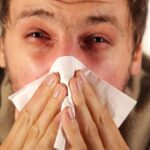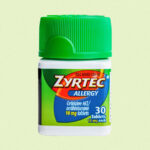What Allergy Medicine Works Immediately?

Allergies, also known as allergic diseases, are a number of conditions caused by hypersensitivity of the immune system to typically harmless substances in the environment. People who have allergies often are sensitive to more than one thing. Substances that often cause reactions are:
- Pollen
- Dust mites
- Mold spores
- Pet dander
- Food
- Insect stings
- Medicines
Normally, your immune system fights germs. It is your body’s defense system. In most allergic reactions however, it is responding to a false alarm. Genes and the environment probably both play a role.
Allergies can cause a variety of symptoms such as a runny nose, sneezing, itching, rashes, swelling, or asthma. Allergies can range from minor to severe. Anaphylaxis is a severe reaction that can be life-threatening. Doctors use skin and blood tests to diagnose allergies. Treatments include medicines, allergy shots, and avoiding the substances that cause the reactions.
How is allergy treated?
The best way to manage an allergy is to avoid the allergen, but this is not always possible. In these cases, medical treatment can help. Drugs will not cure an allergy, but they can help a person manage the symptoms of a reaction. Many treatments are available over the counter. Before using a medication, however, a person should speak to a pharmacist or doctor.
Options include:
- Antihistamines: These block the action of histamine, which the immune system releases during a reaction.
- Decongestants: These can help relieve a blocked nose.
- Corticosteroids: These are available in the form of a pill, cream, nasal spray, or inhaler. They help reduce inflammation.
- Immunotherapy: This can help a person develop long-term tolerance. A person will take gradually increasing doses of the allergen, either as a tablet or an injection.
- Leukotriene receptor antagonists (antileukotrienes): These may help with some allergies if other treatments have not worked. The drugs block some of the chemicals that cause swelling.
What allergy medicine works immediately?
Cetirizine, sold under the brand name Zyrtec among others, is one allergy medicine that works immediately. Evidence indicates that people who take Zyrtec may feel relief in as little as one hour. The drug belongs to the second-generation family, so it is very selective for peripheral H1 receptors, is potent and quickly relieves symptoms, exerts additional anti-allergic/anti-inflammatory effects, and is usually well-tolerated which is why it is considered the best allergy medicine. It works by blocking a certain natural substance (histamine) that your body makes during an allergic reaction.
Zyrtec side effects
Get emergency medical help if you have signs of an allergic reaction to Zyrtec: hives; difficult breathing; swelling of your face, lips, tongue, or throat.
Stop taking this medicine and call your doctor at once if you have:
• fast, pounding, or uneven heartbeat;
• weakness, tremors (uncontrolled shaking), or sleep problems (insomnia);
• severe restless feeling, hyperactivity;
• confusion;
• problems with vision; or
• little or no urination.
Common Zyrtec side effects may include:
• drowsiness, tiredness;
• dizziness, feeling light-headed;
• feeling hot, sweating;
• numbness, tingling, burning pain;
• decreased sense of taste;
• headache;
• upset stomach, nausea, constipation; or
• dry mouth, sore throat.
This is not a complete list of side effects and others may occur. Call your doctor for medical advice about side effects. You may report side effects to FDA at 1-800-FDA-1088.
Zyrtec Safety Information
Before using Zyrtec, tell your doctor about all your medical conditions or allergies, all medicines you use, and if you are pregnant or breastfeeding.
Zyrtec may impair your thinking or reactions. Be careful if you drive or do anything that requires you to be alert. Drinking alcohol can increase certain side effects of cetirizine (Zyrtec).
Tell your doctor if you regularly use other medicines that make you sleepy (such as other cold or allergy medicine, narcotic pain medicine, sleeping pills, muscle relaxers, and medicine for seizures, depression, or anxiety). They can add to sleepiness caused by Zyrtec. Call your doctor if your symptoms do not improve, if they get worse, or if you also have a fever.





